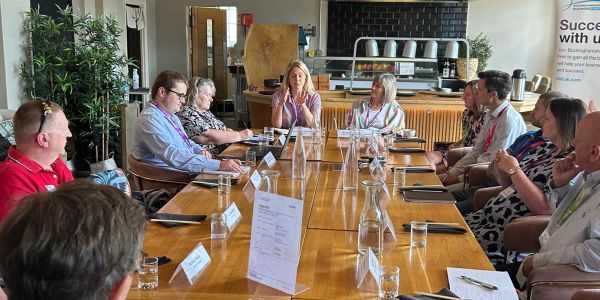- By Arthur Le Geyt, Research Manager, Buckinghamshire Business First
- 1 August, 2025

Share by email
Buckinghamshire Business First is the primary source of insights from the business coalface. This intelligence is used to ensure strategies and policies are based on robust evidence and to ensure government at all levels is aware of the economic issues facing Buckinghamshire’s communities.
Monthly Business Intelligence Summary - July 2025
Local Economic Conditions
Small Business Strategy
On Thursday 31st July, the Department for Business and Trade (DBT) published its plan for small to medium-sized enterprises (SMEs), describing how they plan to make the UK the best place to start and grow a business, with a culture that supports businesses in every community and high street, as part of the Labour government’s Plan for Change.
Key announcements benefiting SMEs in Buckinghamshire include measures to tackle late payments, improving access to finance, and accelerating the planning process for small sites and high-quality brownfield developments.
Following the visit of Gareth Thomas MP, Minister for Services, Small Businesses and Exports, in March to hear directly from local entrepreneurs, founders, and business leaders about the challenges and opportunities facing small enterprises in today’s economic climate, we are pleased to see the views and experiences of the Buckinghamshire business community, and the barriers they face to growth, addressed in this plan.
For more detail on what the government's plan for SMEs means for Buckinghamshire, read our review and analysis here.
Industrial Strategy
Our analysis of the government’s Industrial Strategy (IS-8) sectors reveals that around 64% of businesses in the county are outside IS-8 sectors, while IS-8 businesses employ circa 64,000 people - roughly 25% of the county’s workforce. Sector definitions are based on SIC codes and Beauhurst classifications.
Although the strategy cannot prioritise all businesses, it will remain important to support businesses in other sectors which, in turn, support the IS-8 sectors, such as construction and retail. As a result, it is positive that ‘Backing your business: our plan for small and medium sized businesses’ has been published, setting out policies to support SMEs to grow.
Economic conditions
Economic performance data for 2023 indicates weak productivity in Buckinghamshire. From 2019 to 2023, productivity (GVA per hour worked) declined by 1.4% annually, compared to a 0.7% national increase.
In 2023, productivity was 5.3% below the national average and 11.2% below the South East average. Other economic indicators - GVA growth, job density, business births, exports, and housing affordability - also lag behind regional and national benchmarks.
However, Buckinghamshire shows high business survival and average high-growth firm rates. Resident-based metrics such as employment rates, pay, qualifications, and deprivation levels are also stronger.
Population estimates for 2024 show Buckinghamshire’s population at approximately 578,000, up 1.6% year-on-year - faster than regional and national growth. Over the past decade, the 65+ age group grew by 1.6% annually, while the working-age population grew 0.8% per year, outpacing the national rate.
As of June 2025, 11,320 residents (3.3% of working-age population) were claiming work-related benefits, slightly above the regional average but below the national rate. The Wycombe constituency had the highest claimant rate in the county.
Business Needs and Concerns
On Friday 18th July, Laura Kyrke-Smith, MP for Aylesbury, met with several local businesses at a briefing event hosted by Buckinghamshire Business First.
Laura Kyrke-Smith outlined key government initiatives aimed at supporting local businesses, including the upcoming Planning and Infrastructure Bill, and the government's plan for SMEs. She emphasised her constituency priorities: tackling antisocial behaviour (particularly shoplifting), enhancing transport links such as the Aylesbury spur on East West Rail, addressing healthcare-related economic inactivity, and expanding youth opportunities through early years support and reducing NEETs (not in education, employment, or training).
Business representatives from Aylesbury and Buckinghamshire raised pressing concerns. Key challenges included funding gaps for training and apprenticeships, specifically in construction trades. The limited supply of commercial premises, with implications for workplace experience for young workers, was also a concern.
Rising operational costs were also a key reported challenge, some of which was linked to post-Brexit regulatory burdens and skills shortages, especially for SMEs, with some businesses reportedly offshoring distribution or compromising product quality due to cost pressures. Other challenges included planning policy constraints, lack of office space, and transport barriers to sites impacting youth employment.
Laura Kyrke-Smith committed to escalating these issues to ministers and council leaders.
Want more research and analysis on Buckinghamshire's economy?
Visit our dedicated Reports and Analysis webpages for the latest insights on the Buckinghamshire economy and workforce, and the effect of policy decisions on our local business community.
Image: Laura Kyrke-Smith, MP for Aylesbury, talking with Buckinghamshire Business First and local business leaders, Aylesbury, 18th July 2025.







